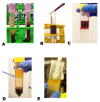Tumor Engraftment in a Xenograft Mouse Model of Human Mantle Cell Lymphoma
- PMID: 29658927
- PMCID: PMC5933280
- DOI: 10.3791/56023
Tumor Engraftment in a Xenograft Mouse Model of Human Mantle Cell Lymphoma
Abstract
B lymphocytes are key players in immune cell circulation and they mainly home to and reside in lymphoid organs. While normal B cells only proliferate when stimulated by T lymphocytes, oncogenic B cells survive and expand autonomously in undefined organ niches. Mantle cell lymphoma (MCL) is one such B cell disorder, where the median survival rate of patients is 4 - 5 years. This calls for the need of effective mechanisms by which the homing and engraftment of these cells are blocked in order to increase the survival and longevity of patients. Therefore, the effort to develop a xenograft mouse model to study the efficacy of MCL therapeutics by blocking the homing mechanism in vivo is of utmost importance. Development of animal recipients for human cell xenotransplantation to test early stage drugs have long been pursued, as relevant preclinical mouse models are crucial to screen new therapeutic agents. This animal model is developed to avoid human graft rejection and to establish a model for human diseases, and it may be an extremely useful tool to study disease progression of different lymphoma types and to perform preclinical testing of candidate drugs for hematologic malignancies, like MCL. We established a xenograft mouse model that will serve as an excellent resource to study and develop novel therapeutic approaches for MCL.
References
-
- Baggiolini M, Dewald B, Moser B. Human chemokines: an update. Annu Rev Immunol. 1997;15:675–705. - PubMed
-
- Baggiolini M. Chemokines and leukocyte traffic. Nature. 1998;392:565–568. - PubMed
-
- Janeway CA, Travers P, Walport M, Shlomchik MJ. Immunobiology: The Immune System in Health and Disease. 5th edition 2001.
-
- Cohen PL, Kurtin PJ, Donovan KA, Hanson CA. Bone marrow and peripheral blood involvement in mantle cell lymphoma. Br. J. Haematol. 1998;101:302–310. - PubMed
Publication types
MeSH terms
Substances
LinkOut - more resources
Full Text Sources
Other Literature Sources





